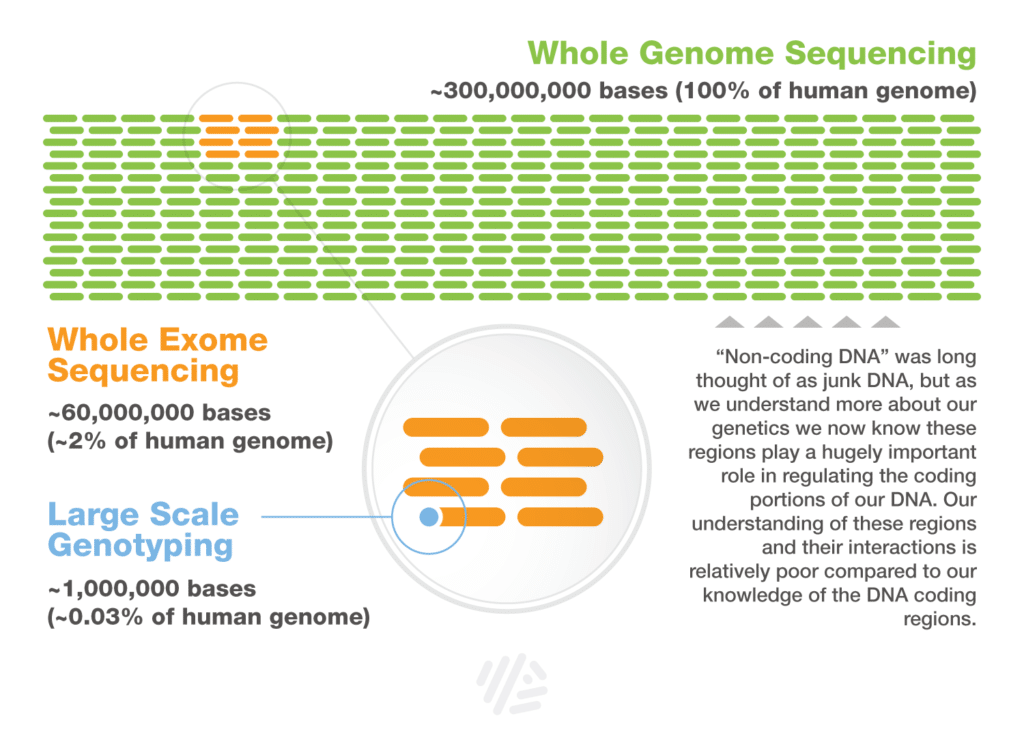Gary Brecka Genetic Testing Review: Is It Worth the Price Tag?
Article at a Glance
- 10X Health, a wellness company founded by Gary Brecka, sells a genetic test for $599
- The test bases recommendations on just 5 genes
- Brecka correctly highlights the role of genetics in elevated homocysteine levels, but it’s hard to justify the price tag of his test based on the limited coverage it provides
- There are several alternative, and much cheaper providers, that offer the same testing for a fraction of the cost
- The 23andme V4 raw data file carries most of the markers covered by Brecka’s test
- Genetic Genie offers users with raw genetic data a free methylation analysis
Genes Mentioned

Contents
It’s not for everyone, but I am a big fan of the UFC, and watch most events, both Fight Nights and PPV. When UFC President Dana White went public with a health turnaround story that he credits to the protocols of a “health guru” named Gary Brecka, it got my attention.
For those of you who are unfamiliar, White learned from a series of advanced blood panels that his risk for heart disease was significant. He suffered from high blood pressure and elevated homocysteine, and according to Brecka only had a life expectancy of 10 years in that state. After cleaning up his health, which involved working to lower homocysteine as a top priority, Brecka believes White has tripled his life expectancy.
The 10X Health Systems Genetic Test
Note: 10X Health Systems is a different company than 10X Genomics.
I did some Googling and saw that Brecka, through his company 10X Nutrition, is offering a genetic test for $599, and a “precision test” for $1,299.
The basic 10X test evaluates just five genes, which makes the $599 price tag shockingly high.
Chris Masterjohn, who I had on the Gene Food podcast a few years ago, did a YouTube video breaking down claims Brecka made when Joe Rogan interviewed him about the work he had done for Dana White. As you would expect from a nutrition PhD, Masterjohn’s rundown is quite technical.
Before his breakdown gets deeper in the biochemistry weeds, he mentions the 5 genes tested by 10X nutrition, and also warns consumers that the cost to test for these SNPs is too high.
I have no opinion on the bulk of Brecka’s work, much of the lifestyle advice seems sound, and I will leave the technical discussions surrounding DNA methylation to our science team.
My goal with this blog post is to let consumers know there are several ways to test the genes covered by Brecka for far less money than 10X is charging.
At $1,299, the 10X Precision Test is even more expensive, offering a 400 page genetic report “covering everything from nutrition to weight management and methylation.”
The 10X Precision Test seems to tie into an IV therapy program, and offers pre-meal supplements and nutrition information. The genetic markers tested aren’t revealed, but the bad 10X reviews are mounting on Trust Pilot.
The Precision Test promises “900 different foods evaluated based on your genes,” but this isn’t how DNA diets work. The purpose of DNA diets isn’t to evaluate individual foods, it’s to formulate a style of eating that optimizes cardiometabolic health. For example, our tests at Gene Food can’t tell you whether pinto beans are healthier than black beans, but we can help you decide whether you should be choosing bacon and eggs, or oatmeal for breakfast in the mornings.
The idea is to help you craft a style of eating for longevity.
Why polygenic risk scoring is important in genetic testing
There is very little a test that focuses on so few genes can tell you about your health.
Companies like ours rely on a scoring system known as polygenic risk scoring to categorize customers because the greater number of genes tested for a trait, the more reliable the result.
Although genetic risk scores have traditionally included variants that meet criteria for genome-wide significance, an extension known as the polygenic risk score has been developed to include the effects of more variants across the entire genome.
national library of medicine
To better understand the concept, think of the stock market. It’s generally viewed as too risky to “put all your eggs in one basket,” by investing large sums in one stock. This is why most people by index funds or mutual funds which are diversified. This is how polygenic risk works. Rather than stake all of your health decisions on a handful of genes, polygenic risk creates categories based on a large number of genes.

Get Started With Personalized Nutrition
Gene Food uses a proprietary algorithm to divide people into one of twenty diet types based on genetics. We score for cholesterol and sterol hyperabsorption, MTHFR status, histamine clearance, carbohydrate tolerance, and more. Where do you fit?
Zooming out even further, just as you don’t want to make major health decisions based on or two genes, you also don’t want to make the mistake of boiling down the state of your health to one trait, like methylation. Consider the image below, which shows the difference between genotyping and whole genome sequencing.
The testing offered by 10X would represent a dot so small it wouldn’t be visible inside the blue dot representing genotype tests like 23andme.

Which genes does 10X test for?
Based on Masterjohn’s video, it appears 10X tests for these 5 genetic markers. We cover each gene in our “Guide to Genetics and Nutrition” and I have linked to the gene pages for each marker below.
Keep in mind that within each of these genes, sit several SNPs, so the 10X testing may be able to do a decent job of predicting methylation for its users if they include full coverage of possible “mutations.” The issues I have with the test are:
- The price
- The potential to overstate the test’s significance
Genes linked to elevated homocysteine
Our science team published an article on the blog about genes linked to elevated homocysteine, with some charts that help show the pathways involved visually. If you’re interested in genetic risk for high homocysteine, that post is a good place to start. Brecka isn’t wrong when claiming that high homocysteine is suboptimal for human health, that is a consensus view in the health profession.
When present at elevated levels homocysteine is associated with numerous poor health outcomes.
Gene Food blog
Cheaper alternatives to Brecka’s 10X Genetic Test
Consumers who already have access to a 23andme raw data file can check their status for the genes covered by Brecka’s test for free. Download raw data from 23andme, and search the raw data file for these SNPs:
- rs1801394 (MTRR) – available on 23andme V4
- rs1805087 (MTR) – available on 23andme V4
- rs1801133 (MTHFR) – available on 23andme V4
- rs1801131 (MTHFR) – available on 23andme V4
- rs4680 (COMT) – available on 23andme V4
- rs4633 (COMT) – available on 23andme V4
- rs41301825 (AHCY) – available on 23andme V4
- rs13043752 (AHCY) – missing from 23andme V4
- rs41312290 (AHCY) – missing from 23andme V4
As you can see, there are 9 likely SNPs the 10X testing looks at. Which providers carry these markers? I ran each through a 23andme V4 raw data file, and found 7/9 SNPs present with a 23andme Health + Ancestry test.
In addition to 23andme, these providers carry the markers tested by 10X.
- Gene Food ($149 raw data / $249 test kit)
- Genetic Genie (free report based on raw data)
- 23andme ($298 Health + Ancestry)
In researching this piece, I found these Reddit threads valuable:
- Is the Gary Brecka genetic testing worth $599?
- Gray Brecka, 10X Health System, and Dana White Endorsement (long form)
Don’t place too much emphasis on MTHFR
For years, this blog has prided itself on providing a sober take on the MTHFR gene. While we vehemently disagree with some in the industry who claim testing for MTHFR isn’t necessary, we also don’t want to spread fear and bad information around common SNPs.
For the perspective of our science team on the topic of MTHFR, have a look at these articles:
- Why there is no such thing as MTHFR symptoms
- MTHFR and the Black Community (read comments)
- Why an MTHFR eating plan isn’t necessary
- MTHFR and folic acid build up
- MTHFR and weight gain
Does this mean MTHFR “mutations” aren’t important? No, they certainly can be. However, our take is that methylation risk should be viewed inside the greater context of a well designed polygenic risk score.
The bottom line on Gary Brecka genetic testing
The 10X genetic test looks at some SNPs relevant to methylation. If a follow-up test for homocysteine is available through your physician’s office, the 10X test could have value in helping to identify a genetic risk factor for heart disease.
However, the price, at $599 for the testing of <10 SNPs is outrageously high. Whole Genome Sequencing providers like Nebula offer WGS services for a comparable price to what Brecka’s company charges to test just 5 genes. Our test kist at Gene Food test for thousands of SNPs at less than half the cost of 10X testing.
Further, users who already have access to 23andme raw data can access this information (albeit un-scored) without paying any additional money.
I have also reviewed the pros and cons of the Gary Brecka diet.

Get Started With Personalized Nutrition
Gene Food uses a proprietary algorithm to divide people into one of twenty diet types based on genetics. We score for cholesterol and sterol hyperabsorption, MTHFR status, histamine clearance, carbohydrate tolerance, and more. Where do you fit?



